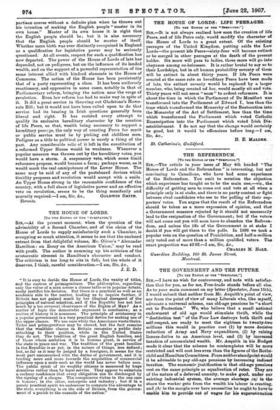THE HOUSE OF LORDS. pro THE XDITCHt OP THE . SPHOTATOIL1
SIR,-,a,t the present moment, when the question of the advisability of a Second Chamber, and of the claim of the House of Lords to supply satisfactorily such a Chamber•, is occupying so much attention, it seems to me that the enclosed extract from that delightful volume, Mr. Oliver's "Alexander Hamilton an Essay on the American lJnion," may be read with profit. The author is summing up his criticism of the aristocratic element in Hamilton's character and conduct. The criticism is too long to cite in full; but the whole of it deserves, I think, careful conaideration.—I am, Sir, As.,
J. E. D.
It is easy to deride the House of Lords, the vanity of titles, and the custom of primogeniture. The philosopher, regarding only the value of a man across a dinner table or in popular debate, easily justifies his derision. But there is a practical as well as an academic side to the matter, leading us to inquire further, if Britain has not gained much by her illogical disregard of the principles of natural selection, and if the Republic has not lost much by a too reverent observance of the Rights of Man? As a matter of logic the democratic argument is conclusive ; as a matter of history it is nonsense. The principle of aristocracy in a popular government is a very practical device for making use of the upper classes. We use ours while the Americans waste theirs. Titles and primogeniture may be absurd, but the fact remains that the wealthier classes in Britain recognise a public duty attaching to their position, while in the United States they do not. The tradition of the great English families, and of those whose ambition it is to become great, is service of the state in peace and war. The tradition of the great families in the Republic is as yet, in the nature of things, less defined; but, as far as it may be judged by a foreigner, it seems for the most part unconcerned with the duties of government, and it is tending more and more towards the acquisition of commercial influence upon a scale such as the world has never before seen. The public spirit of its wealthy citizens is measured by huge donatives rather than by loyal service. They appear to entertain a cockney confidence that every obligation can be discharged by the signing of a cheque. The conspicuous virtue in the one case is honour; in the other, enterprise and industry ; but if in a purely practical spirit we endeavour to compute the advantage to the state, everything is on the side of Britain, from the govern- ment of a parish to the councils of the nation."










































 Previous page
Previous page